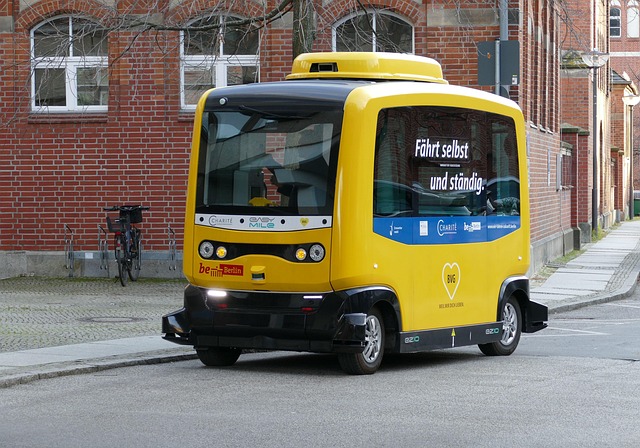Robotic Personal Assistants (RPAs) powered by AI and sensors assist with daily tasks, offering independence for disabled individuals. Advanced navigation systems ensure safe mobility, suggesting a safer future for autonomous vehicles. Select Autonomous Vehicles enhance efficiency in home assistance, agriculture, and share mobility models, reducing individual vehicle ownership. RPAs integrated with smart city initiatives optimize urban transportation, route planning, and traffic flow, promoting sustainability and quality of life for the elderly and disabled. AI advancements enable natural language interaction and environmental adaptation, with 2023 anticipating improved autonomous navigation in urban areas.
Robotic Personal Assistants (RPA) are transforming daily life, offering unprecedented convenience and efficiency. This article delves into the basics and benefits of RPA, exploring how they can autonomously manage tasks in your home. We examine the features and advantages of selecting autonomous vehicles for domestic use, emphasizing integration and compatibility to ensure seamless RPA implementation. Additionally, we analyze future trends shaping the evolution of robotic assistants, highlighting the potential of advanced automation technologies.
- Understanding Robotic Personal Assistants: Basics and Benefits
- Select Autonomous Vehicles: Features and Advantages for Home Use
- Integration and Compatibility: Making RPA Seamless in Daily Life
- Future of Automation: Trends Shaping Robotic Assistant Evolution
Understanding Robotic Personal Assistants: Basics and Benefits

Robotic Personal Assistants (RPAs) are advanced machines designed to assist individuals in their daily lives, offering a range of benefits that can significantly improve efficiency and quality of life. These robots are equipped with artificial intelligence and sensor technologies, enabling them to understand and respond to human commands, navigate environments, and perform various tasks autonomously. From managing schedules and reminders to assisting with household chores or providing companionship, RPAs have the potential to revolutionize daily routines.
One of the key advantages of RPAs is their ability to enhance independence, particularly for individuals with disabilities or limited mobility. Equipped with collision avoidance systems, these robots can navigate complex environments safely, ensuring handicapped accessibility in autos and other spaces. Moreover, as technology advances, RPAs could play a significant role in reducing insurance claims for driverless accidents by minimizing human error on the roads, making our transportation systems safer overall.
Select Autonomous Vehicles: Features and Advantages for Home Use

The future of home assistance is here with the advent of Select Autonomous Vehicles. These intelligent machines offer a multitude of benefits for daily tasks, especially for those seeking assistive technology for the elderly. With their advanced navigation systems and obstacle detection capabilities, self-driving cars can navigate tight spaces and avoid potential hazards, ensuring a safe and efficient environment.
The advantages extend beyond domestic settings; agricultural innovation with AI can revolutionize field management. Self-driving vehicles equipped with AI algorithms can monitor crop health, optimize irrigation, and enhance overall farm productivity. Moreover, these vehicles contribute to improved share mobility models, allowing users to experience the benefits of self-driving cars while potentially reducing individual vehicle ownership, thus positively impacting urban transportation and environmental sustainability.
Integration and Compatibility: Making RPA Seamless in Daily Life

The integration of robotic personal assistants into our daily lives requires seamless compatibility with existing technologies, especially when considering their potential impact on future urban transportation. As we move towards a more autonomous world, the interaction between select autonomous vehicles and RPA can play a pivotal role in enhancing efficiency and safety. For instance, advanced pedestrian detection for cars combined with semi-autonomous driving features can significantly reduce accidents and congestion.
RPA can contribute to the development of energy-efficient self-driving cars by optimizing routes, managing traffic flow, and even participating in smart city initiatives. By learning our habits and preferences, these assistants can make our lives easier and more sustainable, ensuring a smoother transition into an era where technology and transportation merge, reshaping the landscape of urban mobility.
Future of Automation: Trends Shaping Robotic Assistant Evolution

The future of robotic personal assistants is deeply intertwined with the evolving landscape of automation. Trends such as the integration of artificial intelligence (AI) and machine learning capabilities are driving significant advancements, enabling robots to understand natural language commands and adapt to dynamic environments. The rise of select autonomous vehicles, including those designed for urban navigation, promises to revolutionize daily commutes, making transportation safer and more efficient.
Sustainable autonomous vehicles are at the forefront of these innovations, aiming to reduce carbon footprint reduction through automation. As technology advances, these robots are becoming increasingly adept at performing complex tasks, from household chores to industrial operations. In 2023, many experts predict that best self-driving vehicles will continue to improve, offering enhanced safety features and smoother integration into everyday life. This progress not only promises to streamline various sectors but also opens up new possibilities for improved quality of life, particularly for the elderly and individuals with disabilities.
Robotic Personal Assistants (RPA) are transforming daily life, offering unprecedented convenience and efficiency. From understanding their basics and benefits to selecting the right autonomous vehicles for home use, integrating them seamlessly into our routines is achievable through compatibility solutions. As we look ahead, the future of automation holds exciting trends that will continue to shape and enhance the capabilities of these intelligent assistants. By embracing advancements in RPA, we can expect a more connected, streamlined, and automated lifestyle. Select Autonomous Vehicles play a pivotal role in this evolution, opening up new possibilities for an efficient and modern home environment.
